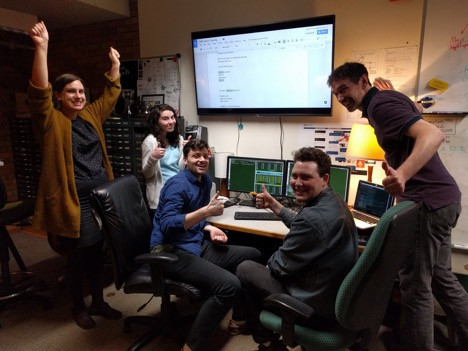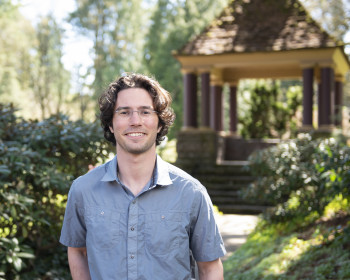Computer Science’s New Concentration: Cybersecurity
Starting in the fall of 2021, Lewis & Clark’s Department of Mathematical Sciences will begin offering a new concentration within the computer science program: cybersecurity. The new concentration in cybersecurity provides students an interdisciplinary approach, bringing together technology, people, information, and processes through the creation, operation, analysis, and testing of secure computer systems.
Open gallery

by Franchesca Schrambling BA ’22
Starting in the fall of 2021, Lewis & Clark’s Department of Mathematical Sciences will begin offering a new concentration within the computer science program: cybersecurity. The new concentration in cybersecurity provides students an interdisciplinary approach, bringing together technology, people, information, and processes through the creation, operation, analysis, and testing of secure computer systems.
This exciting development has been in the works for some time. As innovations in technology grew, so did concerns for increasing cybersecurity. Despite this demand, it has been a challenge to construct a designated space for cybersecurity instruction at Lewis & Clark. Many graduates have gone on to pursue opportunities in cybersecurity, which underscored the need for this concentration to be offered on campus.
“I did a good amount of activities during my four years at Lewis & Clark that helped me gain experience in how to defend networks,” shared Computer Science alum Pim Trouerbach BA ’18, when interviewed for the LCPioneers.com livestream. “Lewis & Clark is one of the few liberal arts schools in the country that has a cybersecurity concentration.”
When interest was expressed by students in a letter to the 2014 Interim Dean of the College of Arts and Sciences, faculty from departments across the college responded with their support. Due to the efforts and interests of faculty over the last few years, especially Professor Jens Mache, the proposal for the concentration based on utilizing existing resources has been approved. The Computer Science (CS) faculty is spearheading the concentration, bolstered by faculty from the International Affairs, Philosophy, Psychology, and Rhetoric and Media Studies departments, as well as the Law School.
“Lewis & Clark students have asked for it since 2014 — and 7 years later, it happened,” said Professor Jens Mache as he reflected on the initiative’s efforts. “It’s hard to predict the future and what students like, but our CS majors per year have grown, and we hope that prospective students will see what we offer at Lewis & Clark.”
To best equip students with both technical training and the human context of cybersecurity, faculty from departments across the college have combined forces. The concentration will provide courses on aspects of law, policy, ethics, and risk management. It will note on diplomas that students have grappled with both the technical details and the human context of cybersecurity.
“This new concentration emphasizes Lewis & Clark’s strength in cybersecurity to prospective students, employers, and industry collaborators. It both highlights our existing assets and paves the way for future growth,” said Associate Professor Peter Drake, chair of the Department of Mathematical Sciences. “I’m excited about this new concentration because so few undergraduate institutions offer programs in cybersecurity.”
For now, the concentration will be available to those with a declared major in computer science & mathematics, a declared major in computer science, or a declared minor in computer science. It will require a minimum of 12 credits - CS 211 Computer and Network Security, CS 293 Networks and Web Development, and a choice of IA 330 Global Security, PSY 425 Human Computer Interaction, PHIL 241 Data, Privacy, and Ethics, and RHMS 241 Data and Democracy.
“It is so clear that there are deep ties between social/international studies and computer science studies—they both balance the world and have a hold much harder than people realize on global stability,” Kaylee-Anna Jayaweera BA ’22 remarked. The international affairs and computer science double-major will be one of the first students to graduate with this concentration. “It adds the ultimate value of legitimacy for students wanting to focus more on this niche topic. I think that it also provides this beautiful bridge between the departments for future collaboration, opinion sharing, research possibilities, and so much more.”
More Newsroom Stories
Public Relations is located in McAfee on the Undergraduate Campus.
MSC: 19
email public@lclark.edu
voice 503-768-7970
Public Relations
Lewis & Clark
615 S. Palatine Hill Road MSC 19
Portland OR 97219

